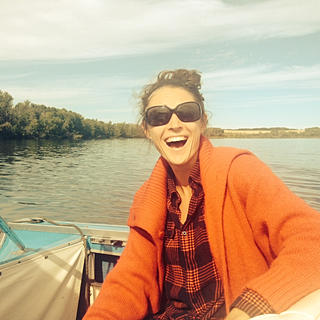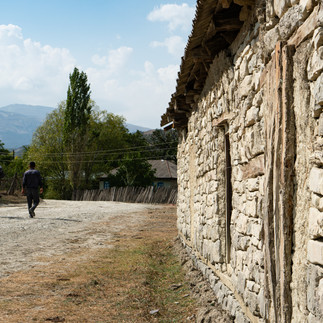PHOTO ESSAY | From Wheat to Lemons: Sustainable Enterprises in Azerbaijan’s Mountain Communities
- Carmen Kuntz
- Oct 17, 2024
- 6 min read
Updated: Dec 5, 2025
How rural communities in Azerbaijan are combining tradition and conservation to drive sustainable economic growth.

Fall is harvest time in Azerbaijan, and the orchards and fields along the road towards the city of Guba are bustling with activity. In each apple orchard there are cars parked between rows of heavily laden trees where ladders lean. Boxes and barrels overflowing with apples are stacked and ready to be picked up. In Soviet times, Guba was renowned for their apples, and there is still a large market for them in Russia and throughout the Caucasus. Apples are a part of traditional agriculture in the lowlands of Guba, along the Qudyal River which brings water from the Greater Caucasus, at 3,000 meters above sea level, down the Caspian Sea, less than 50 km away. Higher up in these mountains, off the main road and tucked away in the remote valleys, working with the land is more challenging.
* * *
VILLAGE OF GONAGHKEND
From the city of Guba to the village of Gonaghkend takes about an hour and the roughly 45 km drive leads through a gorge and along wide riverbeds, past pastureland, scrub forests and landslide shaped landscape. It offers incredible vistas while travelling somewhere between the river valley and mountain tops. A long road bridge crossing the confluence of the Velveleçay and Cimiçay rivers tells you that Gonaghkend is not far. Winding up through the narrow streets of Gonaghkend, it’s not immediately evident that there is a nature conservation project at work. Ducks and chickens cross the road, children walk along the dirt roads to the schoolhouse. But this village was the first one signing an ECF Conservation Agreement in Azerbaijan. The community-based organization called “Gonaghkend Friends of Nature” is well established here, and as a result improvements to the economics of the community are tangible, and the benefits to nature that come hand in hand. Just as you leave Gonaghkend, there is a new building on the right-hand side…one that illustrates ECF’s vision – for people and for nature. As a part of the Financial Participatory Approach, an essential step of an ECF Conservation Agreement, the locals of Gonaghkend developed multiple ideas for revenue generating activities that would improve the local livelihoods. One of them was to use their high-quality spring water to create sparkling lemonade – a popular beverage throughout the Caucasus. This building is the lemonade factory that was built with ECF funding support.
“Early on, people realized that it’s really the locals managing the project, not someone from the outside. This activity (lemonade factory) alone makes the ECF a key element in our village. People see that WWF and ECF support the development of our community as well as the protection of our nature.” - Ilkin Yariyev, CBO leader of “Gonaghkend Friends of Nature”
The CBO “Gonaghkend Friends of Nature” manages the factory which employs three local women year-round, and additional staff during busy times. They designed their own labels and called their lemonade “Our Village.”


“We have a community of really good workers, and we are very happy we can employ some of them.” - Ilkin Yariyev
The first batch was produced in 2022 and the first cases sold in 2023. Popular for weddings and large events, the CBO leader, Ilkin Yariyev sometimes even brings free lemonade to community events, including those ECF events where landscape management strategies are implemented and wildlife compensation schemes discussed – all active parts of their ECF Conservation Agreements.
“In the last 4-5 years people are starting to really understand that we need nature, that is part of us, and this is changing their habits and practices.” - Ilkin Yariyev

Past the lemonade factory, the dirt road leads upwards, towards a village that is just starting its journey with the ECF, but is equally as eager.

* * *
VILLAGE OF XALTAN
Building off the success and momentum of the first phase of the ECF
Building trust is one of the primary challenges of involvement in a new community, and the ECF understands the importance of this aspect of the project. Telling the locals that they will be in charge of decision-making is one thing, but when they see this in action, it carries weight and makes a project successful—in the present moment and in the future. The people of Xaltan have seen and heard about the ECF’s activities in Gonaghkend, and therefore, they are more open to the ECF’s involvement in their community meaning that the introductory steps of the project move along quickly.

“We are buying their lemonade (from Gonaghkend), and we see the income it is producing for families there. We see the income from our mill as a similar kind of activity.” - Amil Shahgeldiyev,

Future activities in Xaltan
As a part of the ECF’s Financial Participatory Approach at the onset of the ECF’s involvement in Xaltan, it was proposed that the creation of a mill in the village would be the most beneficial income-generating activity for the community. The village surrounded by mountains produces hundreds of tons of wheat and must transport it to mills in the lowland, over 80 km away, mostly on dirt roads that are unpassable during times of heavy rain. The mill will allow them to save time and money on the transportation of the wheat and also take control of their production and sales.
“We are focusing on the mill, because wheat is what we have. I remember when we brought wheat to the mill last time; they know Xaltan wheat is good. People often ask if someone from Xaltan brings the wheat, they would like to buy the flour. No sprays or pesticides." - Amil Shahgeldiyev
Wildlife compensation schemes are a newer component of the ECF. They assist farmers in dealing with the impacts of living in proximity to wild animals.
“In each activity, there will be challenges, but I think as a community, I think we will carry the heavy weight together during and after the implementation of the project – for nature.” - Bukhsav Sadayev, veterinarian and Xhaltan local

Key species and habitats
The attitude towards wildlife is shifting since the involvement of the ECF. Many locals understand the importance of having wild animals as a part of their landscape and the necessity of having space for these animals. Brown bear, jackal, wolf, wild boar, rabbit, red deer, chamois, and even bison someday, as a part of an ongoing WWF re-introduction project.
“Some projects are just short term, but this is long term, and I think there will be input/important results for the community and nature.” - Bukhsav Sadayev
Thinking ahead and coming up with their own ideas
“In Soviet times, we had a lot of cattle, but afterwards, the pastures became state-owned, and we had a reduced number of cattle. It would be good if we could lease these summer pastures for the use by villages and put some aside for wildlife and some for livestock.” - Bukhsav Sadayev
Becoming adaptable to changes, like the new road that will be built across the mountains, called the Migration Road as it will follow the traditional routes connecting winter and summer pastures. It will make it easier for shepherds to move their livestock each season, but also open the area to visitors with the opportunities, but also challenges, associated with tourism. “There will be positive and negative effects of the road. The road is development – it is culture – without the road, we have even more challenges. But it will bring about changes.” The community already has plans to sell local dairy products like milk, yogurt and cheese, as well as wheat products created with their own flour. ECF will support the community as it seeks to integrate eco-tourism principles in their future development.
Local actions with global impacts and the connection between biodiversity conservation and climate change mitigation
With global heating and its negative effects on people and nature accelerating, it is urgent time to discuss the ecosystem services that healthy landscapes can provide for climate change mitigation and adaptation. Both the UN Framework Convention on Climate Change and the UN Convention on Biodiversity are holding the Conference of the Parties (COPs) this autumn (2024) looking at how to meet their objectives of keeping global warming below 1,5 oC and dedicating 30% of the land to conservation. At the climate COP in Baku, Azerbaijan, the ECF will present the work being done in the Caucasus with a focus on the importance of protected and conserved areas as tools to preserve and increase the carbon sinks in the forests and grasslands, to develop resilience to events like droughts and floods in an integrated, innovative, cost-effective, manner based on the partnership with local communities.
“You have to fight climate change and protect biodiversity at the same time. You can’t trade one off for the other. Community-based nature conservation supports the ideas and practices on the ground, where biodiversity conservation, adaptation to climate change and its mitigation come together with the questions of human livelihoods.” - Jernej Stritih, ECF Chief Technical Advisor
The eagerness and dedication of locals in Azerbaijan illustrate how local actions can have global impacts. In the mountains, grasslands, forests, and pastures of Azerbaijan, people have a traditional connection and respect for nature, and the ECF’s actions simply help bring the local needs, aspirations and motivations to fruition in the context of today. Many thanks to the communities of Gonaghkend and Xaltan for the hospitality; for their time answering questions, showing us around; for sharing cups of tea and sharing stories. Your passion and connection to the landscapes for the foundation of the ECF.

*
































































































